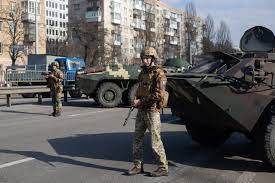Nothing could persuade Finns and Swedes that joining NATO was a good idea during the Cold War and the decades since – until now.
Russia’s invasion of Ukraine has drastically altered Europe’s security landscape, especially in Nordic neutrals Finland and Sweden, where support for NATO membership has reached new highs.
For the first time, a poll commissioned by Finnish broadcaster YLE last week revealed that more than half of Finns favor joining the Western military alliance. A similar poll in neighboring Sweden found that those in favor of NATO membership exceed those opposed.
Former Swedish Prime Minister Carl Bildt, a proponent of NATO membership, tweeted, “The inconceivable might start to become thinkable.”
Neither country will join the alliance on a whim. Support for NATO membership fluctuates, and there is no clear majority in their legislatures.
However, there are undeniable signs of change since Russia launched its invasion last week.
Finland and Sweden broke their principle of not transferring guns to countries at war by delivering assault rifles and anti-tank weapons to Kyiv in response to the attack on Ukraine. Sweden is providing military assistance for the first time since 1939 when it aided Finland in its fight against the Soviet Union.
Apparently detecting a shift among its Nordic neighbors, Russia’s Foreign Ministry expressed worry last week over efforts by the US and some of its allies to “bring” Finland and Sweden into NATO, warning that if they joined, Moscow would be compelled to take punitive measures.
Sweden and Finland’s governments retorted that Moscow would not be allowed to dictate their security policies.
“I want to be very clear: Sweden decides on our security policy line by itself and independently,” Swedish Prime Minister Magdalena Andersson stated. Finland and Russia, with whom it shares a 1,340-kilometer (830-mile) border, have a tumultuous history. Finns have fought hundreds of conflicts against their eastern neighbor, both as part of the Swedish Kingdom for centuries and as an independent nation during World Wars I and II, including two with the Soviet Union in 1939-40 and 1941-44.
Finland, on the other hand, pursued pragmatic political and economic connections with Moscow in the postwar years, maintaining militarily nonaligned and serving as a neutral buffer between East and West.
For more than 200 years, Sweden has shunned military alliances, opting for peace after decades of conflict with its neighbors.
By entering the European Union in 1995 and expanding collaboration with NATO, both countries put an end to historic neutrality. However, until Russia’s action against Ukraine, a majority of citizens in both nations were adamantly opposed to full participation in the alliance.
According to the YLE poll, 53 percent of Finns support joining NATO, while only 28% oppose it. The poll has a 2.5-percentage-point margin of error and included 1,382 respondents who were questioned between February 23 and 25. The invasion of Russia began on February 24.
“It’s a huge shift,” said Matti Pesu, a senior researcher at the Finnish Institute of International Affairs. “We’ve got a situation where Finns’ sentiments on NATO have remained extremely steady for the last 25-30 years.” It appears to have entirely changed now.”
Georgia’s ruling party announced Wednesday (2 March) that the country will ‘immediately’ apply for fast-track EU membership, a day after the European Parliament endorsed war-torn Ukraine’s application.
Irakli Kobakhidze, the head of Georgian Dream, stated the party’s “determination today to apply for EU membership immediately.”
He told reporters that Tbilisi wants the EU to “urgently assess our application and make a decision to grant Georgia the status of an EU membership candidate.”
If the current trend continues, Moldova could be the next country to apply for EU candidate status.
Moldova’s security is currently jeopardized, with Russian forces undertaking military operations near its borders in Ukraine. Russia’s objective, according to some observers, is to link the Moldovan territory of Transnistria, which Moscow controls, with the Ukrainian Black Sea territories it wants to seize.

















